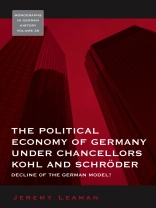While unification has undoubtedly had major effects on Germany’s political economy, the pattern of current policy-making preferences was established at an earlier stage, in particular, at the beginning of the ‘Kohl-era’ in 1982. This essentially neo-liberal pattern can be seen to have dominated the modalities chosen to guide Germany through the process of unifi cation and was mirrored in developments in other OECD countries and in particular within the EU. This book demonstrates that the three policy imperatives (neo-liberal structural reform, European monetary integration, and unification) produced a policy-mix which, together with other structural economic and demographic factors, has had disappointing results in all three areas and hampered Germany’s overall economic development.
قائمة المحتويات
List of Tables and Figures
Introduction
Chapter 1. 1982: Crisis and Transition
Chapter 2. The Fall of Helmut Schmidt and the Formation of the Wende Administration
Chapter 3. The Kohl Era: CDU Supply-sidism in Practice
Chapter 4. Liberalisation and Monetary Accumulation
Chapter 5. German Unification and the Unravelling of Neoliberalism
Chapter 6. The Transformation Crisis in the East in an International Context: 1995-2006
Chapter 7. Squaring the Circle: Politico-economic Trends in the Schröder Era
Chapter 8. Coping with Stagnation: the Persistent Contradictions of Economic Orthodoxies in Germany and Europe
Bibliography
Index
عن المؤلف
Jeremy Leaman is Senior Lecturer in German and European Political Economy at Loughborough University. He has published widely on German political economy and modern German history. He is currently working on a study of the political economy of taxation. He is also managing editor of the Journal of Contemporary European Studies and is a member of the editorial board of Debatte – Review of Contemporary Central and Eastern Europe.












